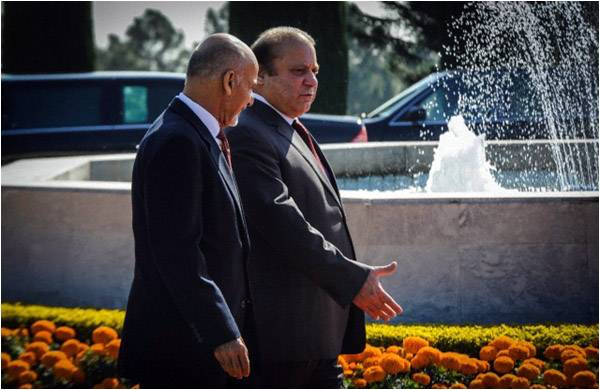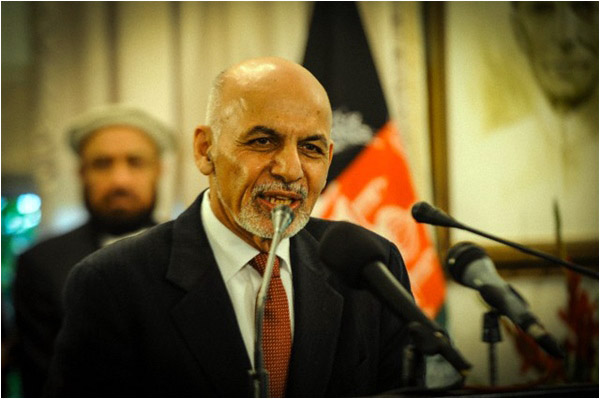
The recent visit of Afghan President Dr Ashraf Ghani to Pakistan has certainly marked a new beginning in bilateral relations between Islamabad and Kabul. The visit was a huge boost to mutual trust at state level, which had been largely absent because of the follies committed in the past. The recent terror attack in Peshawar and the consequent visit of the Chief of Army Staff and the ISI chief to Kabul also shows the improving level of trust.
President Ghani, who was sworn in as the president of Afghanistan after a brief standoff over disputed elections results is known as a cool political operator. During his visit, he met both the civilian and military leadership of Pakistan and was rightly given a red carpet welcome which he spoke very highly of after his return to Kabul. While speaking to Afghan MPs on his return, Mr Ghani said: “The way I was received in the GHQ, I felt, for a moment, as if I am the President of Pakistan.” This was confirmed by Senator Arifullah Pashtun, who is the chairman of Afghan Foreign Relations Committee of the Senate of Afghanistan.
This is certainly a new beginning, Senator Pashtun said. There is a tremendous goodwill at the people-to-people level on the both sides, which must be reproduced at the state level. “Now is the perfect time to translate promises into something tangible without any further delays,” he said. “Spoilers on both sides are quite active, trying to spoil the gains made during the visit.”
Pakistani officials are also of the same view. “Yes. There are visible signs of a shift from the past and genuine efforts were made by both sides to make things happen at the highest levels,” said an official of security establishment. He said that the recent trips made by the Chief of Army Staff, the ISI Chief and the President of Pakistan to Kabul were indeed ice breaking events which contributed to the success of the recently concluded trip of President Ghani to Pakistan. He also referred to the recent drone strike on Maulvi Fazlullah, head of Tehrik-e-Taliban Pakistan (TTP), who is wanted by the State of Pakistan and is blamed for planning and executing terrorist attacks inside Pakistan from across the border. He termed this strike, which took place inside Afghanistan, a positive development and an indication of efforts being made for mending fences. Moreover, he said the Afghan side is quite happy with the Zarb-e-Azab operation and have not only acknowledged Pakistan’s apprehensions vis a vis India’s alleged funding of activities inside Pakistan, but also promised to taking steps to address Pakistan’s genuine grievances.

Khadim Hussain, a Peshawar-based political analyst, believes that Afghanistan is a sovereign country and it should be treated in a way any sovereign country is treated. “In order to improve relations with Kabul, Pakistan should avoid making unrealistic demands from the Afghan government,” said Hussain, while referring to Pakistan’s objection to Kabul-New Delhi ties. He said Pakistan and Afghanistan should find a solution to the question of safe havens for terrorists on both sides, and mutually improve border management.
“Ghani is very much aware of the regional dynamics and he perfectly knows how to win over Pakistan support,” said defence analyst Brigadier retired Nazir who has served in Pakistan Army. He said that President Ghani’s visit to the two closest friends of Pakistan before making a stopover in Islamabad was a smart move. Moreover, he said, Ghani’s dream of re-launching Afghanistan as a trade hub linking Central and South Asia and the Caucasus can only come true if China along with Pakistan is on board.
The civil society is also quite optimistic about the prospects of Pak-Afghan relations especially after smooth transitions of power in both the countries. Raza Shah Khan, head of Sustainable Peace and Development Organization, an Islamabad-based civil society group, also spoke optimistically about Ghani’s visit. He said it should be complemented by track II diplomacy which can imbed the necessary element of sustainability into our relations which remained volatile throughout history. “We are in the era where states have moved from state centric security to human centric security; therefore, it is high time for both the countries to start investing in their people,” he said.
Yousaf Ghaznavi, who works as an advisor to the Parliament of Afghanistan, expressed the same hopefulness. “The visit has generally aroused the feel good factor on the Afghan side and specifically among the youth which is quite upbeat about the future prospects for any healthy Pak-Afghan engagement,” said Ghaznavi. He said the recent spike in Afghan Taliban’s attacks after Ghani returned to Kabul may hurt the prospects of the successful meeting, but hoped Ghani would not make any knee-jerk reactions.
Pakistan and Afghanistan are passing through testing times, and unlike the US, they don’t have the luxury to walk away from the situation.
President Ghani, who was sworn in as the president of Afghanistan after a brief standoff over disputed elections results is known as a cool political operator. During his visit, he met both the civilian and military leadership of Pakistan and was rightly given a red carpet welcome which he spoke very highly of after his return to Kabul. While speaking to Afghan MPs on his return, Mr Ghani said: “The way I was received in the GHQ, I felt, for a moment, as if I am the President of Pakistan.” This was confirmed by Senator Arifullah Pashtun, who is the chairman of Afghan Foreign Relations Committee of the Senate of Afghanistan.
This is certainly a new beginning, Senator Pashtun said. There is a tremendous goodwill at the people-to-people level on the both sides, which must be reproduced at the state level. “Now is the perfect time to translate promises into something tangible without any further delays,” he said. “Spoilers on both sides are quite active, trying to spoil the gains made during the visit.”
Pakistani officials are also of the same view. “Yes. There are visible signs of a shift from the past and genuine efforts were made by both sides to make things happen at the highest levels,” said an official of security establishment. He said that the recent trips made by the Chief of Army Staff, the ISI Chief and the President of Pakistan to Kabul were indeed ice breaking events which contributed to the success of the recently concluded trip of President Ghani to Pakistan. He also referred to the recent drone strike on Maulvi Fazlullah, head of Tehrik-e-Taliban Pakistan (TTP), who is wanted by the State of Pakistan and is blamed for planning and executing terrorist attacks inside Pakistan from across the border. He termed this strike, which took place inside Afghanistan, a positive development and an indication of efforts being made for mending fences. Moreover, he said the Afghan side is quite happy with the Zarb-e-Azab operation and have not only acknowledged Pakistan’s apprehensions vis a vis India’s alleged funding of activities inside Pakistan, but also promised to taking steps to address Pakistan’s genuine grievances.

Khadim Hussain, a Peshawar-based political analyst, believes that Afghanistan is a sovereign country and it should be treated in a way any sovereign country is treated. “In order to improve relations with Kabul, Pakistan should avoid making unrealistic demands from the Afghan government,” said Hussain, while referring to Pakistan’s objection to Kabul-New Delhi ties. He said Pakistan and Afghanistan should find a solution to the question of safe havens for terrorists on both sides, and mutually improve border management.
“Ghani is very much aware of the regional dynamics and he perfectly knows how to win over Pakistan support,” said defence analyst Brigadier retired Nazir who has served in Pakistan Army. He said that President Ghani’s visit to the two closest friends of Pakistan before making a stopover in Islamabad was a smart move. Moreover, he said, Ghani’s dream of re-launching Afghanistan as a trade hub linking Central and South Asia and the Caucasus can only come true if China along with Pakistan is on board.
"It is high time they start investing in their people"
The civil society is also quite optimistic about the prospects of Pak-Afghan relations especially after smooth transitions of power in both the countries. Raza Shah Khan, head of Sustainable Peace and Development Organization, an Islamabad-based civil society group, also spoke optimistically about Ghani’s visit. He said it should be complemented by track II diplomacy which can imbed the necessary element of sustainability into our relations which remained volatile throughout history. “We are in the era where states have moved from state centric security to human centric security; therefore, it is high time for both the countries to start investing in their people,” he said.
Yousaf Ghaznavi, who works as an advisor to the Parliament of Afghanistan, expressed the same hopefulness. “The visit has generally aroused the feel good factor on the Afghan side and specifically among the youth which is quite upbeat about the future prospects for any healthy Pak-Afghan engagement,” said Ghaznavi. He said the recent spike in Afghan Taliban’s attacks after Ghani returned to Kabul may hurt the prospects of the successful meeting, but hoped Ghani would not make any knee-jerk reactions.
Pakistan and Afghanistan are passing through testing times, and unlike the US, they don’t have the luxury to walk away from the situation.

